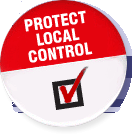Why Local Control?
When a community's elected officials move to protect their citizens against the health hazards of secondhand smoke, the usually influential tobacco companies are suddenly powerless. So they try to close the door to local ordinances via preemption at the state level.
Local Control Means Meaningful Local Debate and Community Change
Local control is at the heart of our broader goal of educating the public about the health effects caused by secondhand smoke and changing attitudes regarding smoking in ways that harm other people. A powerful change process unfolds as a community debates the issue of secondhand smoke. Letters to the editor, town hall meetings, public debate, and media coverage all ensue. During this process, the community gains an increased understanding of the health risks associated with secondhand smoke, resulting in strong community support for a law protecting nonsmokers.
Ease of Enactment
Meaningful smokefree air legislation is much easier to enact at the local level where policymakers are most responsive to the concerns of constituents and less influenced by tobacco industry lobbyists and campaign contributions. The tobacco companies are forced to work at the local level through fake front groups and allies, whereas they are able to directly engage policymakers at the state and federal level without as much of a credibility gap. Big Tobacco would much rather bottle up or weaken one bill at the state house rather than try to track and fight hundreds of local policy efforts throughout a state.
Ease of Enforcement
Because local residents typically have a higher understanding of the need for a smokefree law at the local level, compliance rates tend to be very high for local ordinances. Local enforcement agencies such as health departments are easily accessible to the community, whereas statewide enforcement can be less reliable or responsive. In addition, not every community in a state is at the same level of public education regarding secondhand smoke.
